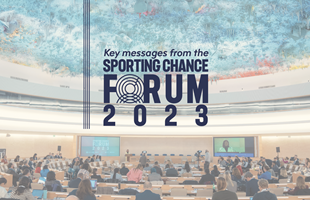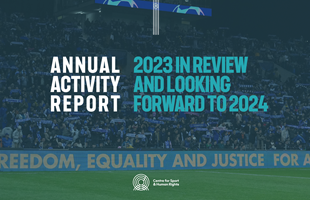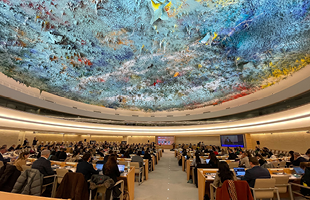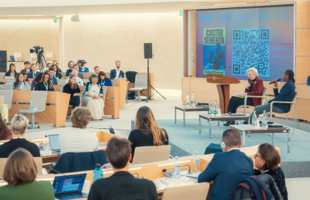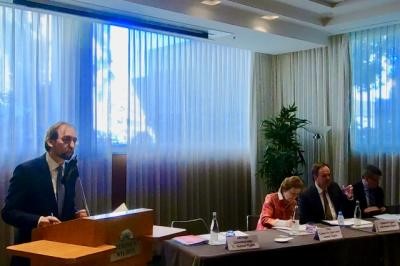
This speech originally appeared on the OHCHR website.
On 26th June 2018, the Centre for Sport and Human Rights was launched in Geneva.
Marking the official launch, the nearly 40 founding members of the Advisory Council of the new Centre were welcomed with remarks by the UN High Commissioner for Human Rights Zeid Ra’ad Al Hussein, the Director-General of the ILO Guy Ryder, and the Centre’s founding Chair Mary Robinson (former President of Ireland and former UN High Commissioner for Human Rights).
Distinguished Chair, Director-General Ryder, Dear Mary, Excellencies, Colleagues, Friends,
I welcome this inaugural meeting of the Advisory Council of the new Centre for Sport and Human Rights. Sports are a key arena of our communal public life. Events such as the Olympic and Paraolympic Games, the FIFA World Cup and the UEFA Champions League – to name just a few – are extraordinary moments in people’s lives, bringing nations together in shared excitement and celebration, and creating new opportunities for cross-cultural communication and sportsmanship, both on and off the fields. At its best, sport is a thrilling display of talented interaction in pursuit of collective goals, conducted in fairness, unity and respect for diversity.
Among athletes, sports call forth perseverance, resilience, teamwork, humility, grace, and grit, as well as a keen balance of individual and shared needs. From observers and fans, sports elicit inspiration, respect and collective engagement. And for communities, sporting events can generate jobs, foster healthy living and youth participation, and lead to significant urban development.
But both on and off the field, discrimination and racism have frequently tarnished the world of sports – from local and even school-level competitions to regional and global championships.
I take this opportunity to honour the efforts of all the organizations and individuals who have worked towards combatting racial and other forms of discrimination in sport, and who have begun to align sports around the world with human rights principles.
In addition to the taint of discrimination and racism, too often, mega sporting events have inflicted harm through deplorable and exploitative conditions for workers, the displacement of residents, and corruption. Failures to prevent and confront such abuses undermine sport’s unique capacity as a force for good.
It is fitting that the new Centre be established in this year of mobilisation for the 70th anniversary of the Universal Declaration of Human Rights.
I view this independent Centre is an important step in scaling up our efforts to ensure that sports and mega sporting events are grounded in the Universal Declaration’s enduring message of respect for the equal dignity and rights of every human being.
Over the past few years, my Office has worked steadfastly with sport governing bodies, NGOs and governments to promote the rights and dignity of all people involved in sports. From the outset, we have been actively engaged in the Human Rights and Mega Sporting Events Platform, participating in both the Advisory Group and the Steering Committee. The Office is also represented in FIFA’s Independent Human Rights Advisory Board.
I have been encouraged to see the strong push towards embedding human rights norms and standards into all aspects of mega sporting events, recognising the responsibilities of all parties, identifying best practices and working towards the establishment of effective accountability mechanisms.
Several organisations have also taken important steps to address the risk of human rights abuses in sport. In 2017, we welcomed FIFA becoming the first sport governing body to adopt a human rights policy. We also welcomed the adoption of human rights principles by the Commonwealth Games Federation, UEFA, and the International Olympic Committee, in its Host City Contract for 2024.
For each of these advancements, the Sporting Chance Principles and the UN Guiding Principles on Business and Human Rights have acted as roadmaps.
The process leading up to today’s event is in itself a testament to the power of principle and collective action. I congratulate all present on achieving consensus despite many challenges.
But this is a marathon, not a sprint. Important questions remain for your body, with many priorities to be set, and thorny issues to be addressed – from the need to safeguard the rights of all athletes, without discrimination; to ensuring that the rights of workers are respected throughout often complex supply chains.
Still, I remain confident that you will build on the progress already achieved, and that the new Centre will be a driving force in transforming the global landscape of sport – fostering the development of more comprehensive, consistent, and accountable governance for all sports events aligned with international human rights and labour standards.
Sports demonstrate that our values of shared humanity are stronger than the forces that want to divide us. We must continue to deploy dialogue and principle to ensure all actors fully embrace and implement their responsibilities to respect human rights, setting the standard for all other realms of human society.
As we look to the future, we can seek inspiration from the collective approaches which have enabled so many athletes to achieve far more than any individual efforts could deliver.
My Office looks forward to continuing our involvement with all of you on the important agenda of sport and human rights, including at this year’s Social Forum which will explore multiple human rights issues associated with sports in October. We also look forward to joining you all at the Sporting Chance Forum in December in Paris, which will come at the time of our celebration of the 70th Anniversary of the UDHR. I am confident that as we work together, we will help the world move closer to ensuring that the aspirations set out in the Universal Declaration of respect for humankind and dignity – which stand at the heart of all sporting traditions – are at last fully realised.
I thank you.

